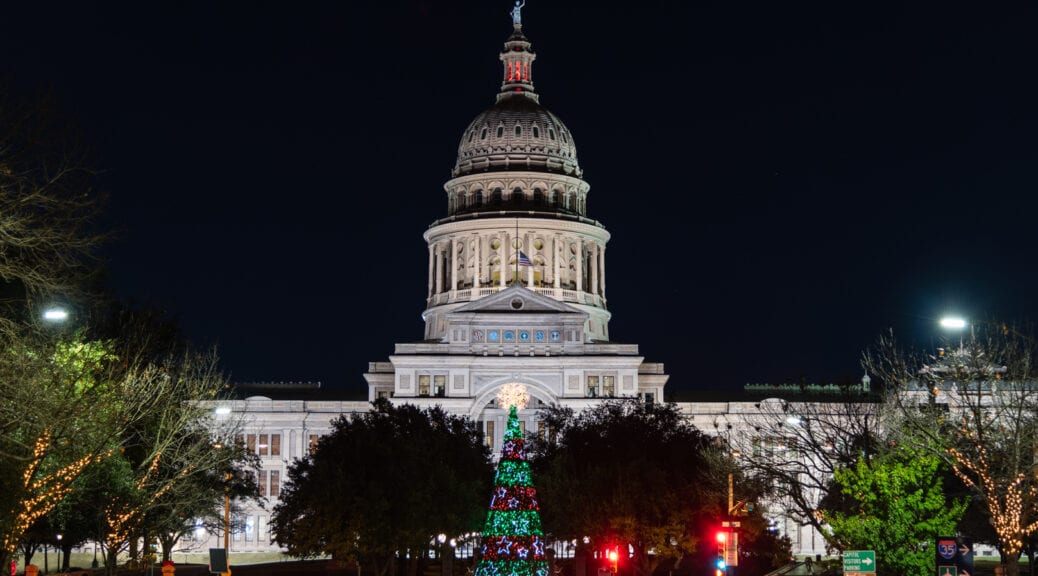
Return to December 2020 newsletter
Around the Texas Capitol: Gearing up for a very different legislative session
By Lauren Fairbanks, Shayne Woodard and J Pete Laney
TAD Governmental Affairs
Along with the regular hustle and bustle of the holiday season, this year we’re also busy ramping up for another legislative session in Austin. The 140-day 87th Legislature begins meeting on Jan. 12, and it is set to end May 31. But much of the work has already started.
Dec. 12 marked the final date for campaign contributions to be made before a fundraising moratorium goes into effect. The moratorium lasts through the governor’s veto period following session. The Texas Association of Dairymen (TAD) Political Action Committee (PAC) was positively active this election cycle and wishes all state officials the best of luck in the upcoming legislative session.
Additionally, bill filing began shortly after the dust settled on Election Day. On the first day alone, 500 bills were filed, with over 1,000 bills filed already. A typical legislative session sees anywhere from 6,000 to 8,000 bills filed. Only time will tell if the volume will be similar to past sessions given current circumstances, though the number of bills passed will likely pale in comparison.
There has been quite a bit of speculation around Austin about what a legislative session will look like in the midst of a global pandemic that is worsening as the holidays approach. How do lawmakers safely allow the public to interact with the legislative process, whether it’s entering a Capitol building that has been closed since March, or testifying on legislation. To date, no guidelines have been formalized in either the House or Senate, although leadership in both chambers are considering their options.
Presumptive House Speaker Dade Phelan has established a COVID-19 Work Group charged with providing recommendations prior to the first day of session. One member of the COVID Work Group recently offered some insight into what is being considered. Some possibilities include testing prior to entering the Capitol; access to the Capitol limited only to those with appointments; alternative voting options that do not require members to be at their desk in the chamber; virtual public participation; and face masks required in public places throughout the Capitol.
The Senate was rumored to have discussed similar guidelines that will be in place for at least the first 60 days of session. It is anticipated that committee hearings will begin later in the process than usual and could require pre-registering for the hearing in addition to testing.
Constitutionally, the Legislature is only required to pass a budget every two years. And, with it presumed to be harder than normal to solicit public input through the committee hearing process, far fewer bills are expected to be considered.
In addition to the budget, 2021 is a redistricting year. Following the U.S. census, state and federal legislative lines across the country, including Texas, have to be redrawn to account for population shifts in order to ensure equal representation. Expect the budget, redistricting and any necessary COVID-related measures to suck the air out of the room at the Texas Capitol.
Your TAD team is committed to protecting the interests of the dairy industry again this session.
While the TAD Board’s regular session trip to Austin for Dairy Day will not take place, we want to assure you that the voice of Texas dairy farmers, communities and the industry will continue to be heard in the halls of the Capitol.
Election Update
Election Day is Saturday, Dec. 19, in the runoff election for Senate District 30. State Rep. Drew Springer of Muenster, who has been endorsed by Gov. Greg, is running against Shelley Luther, a beauty salon owner, to fill the seat. The winner of SD 30 will replace Pat Fallon, who was recently elected to the U.S. House in Texas’ 4th Congressional District.
If Springer wins, that will necessitate a special election for his House seat; if he loses, he will retain his seat.
This is an important election for Texas dairy farmers, as the district includes Archer, Clay, Cooke, Erath, Grayson, Jack, Montague, Palo Pinto, Wichita, Wise and Young counties and parts of Collin and Denton counties.
Recent Government Highlights
Nov. 24: Comptroller Glenn Hegar completed the transfer of $2.27 billion into the State Highway Fund (SHF) and the Economic Stabilization Fund (ESF; commonly known as the “Rainy Day Fund”). Each fund received more than $1.13 billion, or 50% of the total transfer. The COVID-19 pandemic and recent volatility in oil prices contributed to the transfer amounts being lower than the $1.66 billion each fund received in fiscal 2020. When fiscal 2020 ended on Aug. 31, the ESF balance was $10 billion. With this most recent transfer, the new balance will be about $10.7 billion,
Nov. 30: The Texas Constitution limits the rate of growth of appropriations from state tax revenues not constitutionally dedicated to the rate of growth of the state’s economy and the Legislative Budget Board (LBB) sets the constitutional spending limit. LBB staff estimated the amount of appropriations from state tax revenue that are not dedicated by the constitution to be $98.8 billion as of Nov. 18. That amount was multiplied by the estimated rate of growth of Texas personal income from the 2020-21 biennium to the 2022-23 biennium. The board set the spending limit based on a 7.06% growth rate, calculating the cap at $105.8 billion. Comptroller Glenn Hegar also joined the meeting virtually to give an update on the state’s financial help. Hegar reported that revenue collections have outperformed what was expected given the pandemic but are still down significantly compared to a year ago. An official revenue estimate is expected Jan. 11.